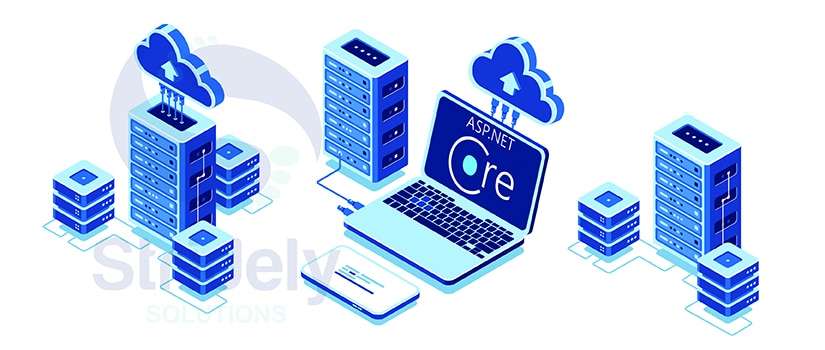Developed as an open-source platform, ASP. NET is the first choice of a majority of the developers when it comes to building feature-rich, scalable web applications. A new release encompasses a modular framework that owns the capability to run on all platforms, irrespective of the kind. If you compare this with the earlier versions, the former seems to be a lot more influencing.
ASP.NET core comprises of the latest versions of Web pages, Signal R, .NET MVC, and Web API, enabling developers to use each of them either independently or in conjunction to build efficient applications.
The ASP. NET Core Framework has grabbed the attention of a lot of developers and software companies who now actively invest in hiring DOT NET developers. Greater performance, improved speed and leveraged scalability, the core framework of DOT NET have all. If you aren’t aware of what and how do the recent release of DOT NET benefit the development phase of web and cloud-based applications, this article is just for you. Designed to enunciate the top features of ASP. NET Core framework, we help you get a better view of the technology and underlying benefits.
Exciting Features To Build Web & Cloud-Based Applications Using ASP. NET
- Cross-Platform Connectivity
Unlike the ASP.NET MVC Development Services, the ASP.NET Core Framework supports the cross-platform feature set. Meaning that irrespective of the platform you target to build the application for, it would function seamlessly across all OS. Whether it is Linux or Unix or Mac OS, the framework can efficiently integrate with all and is, therefore, regarded as one of the frameworks with the highest efficacy.
Additionally, the framework gives developers the freedom to gel with applications or specific technologies that can enhance the performance of the developed application. Docker as a PaaS, Azure for cloud deployment and Kubernetes for app management automation, the all-new ASP. NET Core integrates all. In case you are concerned about the application life cycle, don’t worry about the command line tools as part of the SDK will take care of it.
- Merging Developmental Models
The two most important models of application development, Model-view-controller and the web API development, ostensibly are the same and gives an impression of being the same. The fact that both entail the same base controller, which embeds abstract classes to do the task, accounts for the amalgamation. This coalition enables the controller to reveal the feature of the web service along with the view of the application (HTML). Incorporating ASP.NET Core’s MVC model adds functionality when one needs to create web APIs or testable applications. The fusion model also provides support to the data formats whereas the content negotiation leads to ubiquitous applicability of the web across all web and mobile platforms.
- Improved Performance
Shifting the HTTP request size from 30kb to 2kb, the entire Microsoft team has worked hard to ensure that the perform ASP.NET core is greater and better than the traditional one. And undoubtedly, they have been successful in doing so. As a matter of fact, the performance of the present version is 10 times better than conventional ASP. NET. Features such as serialization, concurrency, compression, and networking, all of which hold significant importance and usage in web application development, seem to be a lot simpler in ASP.NET Core. All of the above has a compounding effect on the enhanced performance of the framework.
- Health Check APIs
Till date, there hasn’t been a feature or a tool that could test the status of the in-application components. With ASP. NET Core, the Microsoft team steps forward, deploying the iHealthCheck Service. This apparently is the diagnostic service applied in the application and is capable of testifying the efficacy of the components as part of the system. Also, it can be used to do a backend check on separate sites and the database, as used in the application. The fact that the framework has tons of libraries along with features and functionalities, the incorporation of such a diagnostic service would help developers keep an eye on the performance of the different systems and other dependencies.
- SignalR Java Client
In line with the above, ASP.NET Core extends its feature set to the Java client for SignalR. The team worked upon the same to finance build a library for the Core Framework of ASP.NET. This enables the server code to pitch asynchronous messages to the web applications that reside on the client-side. Depending on the best possible route, the signal itself selects the medium of transporting content from either side. This is possible because the framework uses WebSocket, an HTML API that facilitates bidirectional data transfer. What’s best about this feature is the fact that it promotes the addition of web functionality in real-time.
- Dependency Injection
One of the most important and fascinating features that developers look forward to while working on a web development project. The concept of dependency injection walks along with that of the MVC pattern. Using this, DOT Net developers can embed net loosely coupled codes that are proven to better the issues of coupling and accounts for better testability. As ASP. NET focuses on reliability and flexibility components, the integration of the concept of dependency injection adds to it. In case you are planning to work with this much more organized and consolidated architecture model, you need not worry about the implementation as ASP. NET does that for you.
- Reduced Coding
ASP. NET Core is designed in a way that it can put the common APIs to use. Meaning that the ones that were deployed for the DOT NET framework or the ones that are specifically tailored to gel with Unix or Linux OS can effectively be integrated with the ASP. NET Core design. No matter whether the API was made for .NET Standard Or Framework, it would function on Core as well, thereby reducing the efforts needed to rewrite the same piece of code, time and again.
Conclusion
Evidently, ASP. NET Core is better, stronger and a lot more efficient as compared to the earlier ones. Whether you consider the performance bar or the speed or the efficacy, ASP. NET Core leads the charge. In case you have been looking to deploy mobile web and cloud application, ASP. NET Core would serve your purpose best.


